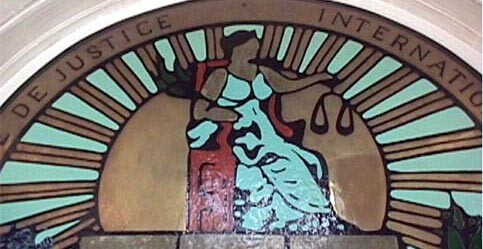25 January 2004

We, the undersigned Israeli peace and human rights organizations, wish to make our views known to the International Court of Justice concerning the Wall currently under construction by the Israeli government in the Occupied Palestinian Territory .
As Israeli citizens, we are troubled that the position of the Israeli government regarding this Wall does not reflect our views, nor does it necessarily reflect the views of the Israeli public.� We represent a significant segment of the population in Israel who object to construction of this Wall, and we call upon the Court to demand that it be dismantled, for the reasons that follow.
The construction and location of the Wall are in grave breach of international humanitarian law as articulated inter alia by the Fourth Geneva Convention.� The Wall is actually a complex system of walls and electronic fences that surround and isolate tens of thousands of Palestinians who are innocent of all wrongdoing.� While Israel clearly has the responsibility to defend its citizens against terrorist and other attacks, we hold that the Wall� although presented to the public as a security measure� in actuality constitutes a political border that defines the Bantustan-like state that Israel is planning for the Palestinians in the West Bank .� This is evident from the route of the Wall which, by surrounding Areas A and B, creates �cantons� (as Prime Minister Ariel Sharon has referred to them) in which the Palestinians will be confined.� Indeed, the Wall reaches deep into Palestinian territory in order to encompass �settlement blocs,� thus extending the Israeli civilian and military presence far inside Palestinian territory.� This route clearly reveals that the Wall is designed to serve political, not security, objectives. It will unilaterally define a boundary that ensures Israeli control of the entire region between the Mediterranean and the Jordan River.
Israel argues �military necessity� in its defense of the Wall.� International humanitarian law, however, mandates proportionality between military necessity and the well-being of the civilian population under occupation.� The Fourth Geneva Convention obligates the occupying power to respect and ensure the fundamental rights of the civilian population to personal security, dignity, a livelihood, freedom of movement, and access to property, education and medical care� all irreparably harmed by the route and scale of the Wall, as well as the constraints on movement that it entails.� Despite the serious repercussions of its construction, no study was undertaken by the Israeli government to survey the impact of the Wall on the civilian Palestinian population.
In addition, the Fourth Geneva Convention prohibits an Occupying Power from making its occupation permanent.� The erection of a $2-3 billion system of massive barriers, walls, electronic fences, security roads, roadblocks, checkpoints, and military installations constitutes such permanent presence, especially when taking into account the dramatic alteration in land use, demography, induced population transfer, and other irreversible changes in Palestinian life emanating from the presence of the Wall.
We the undersigned have approached the Israeli Minister of Foreign Affairs with our request to include this statement in the materials presented to the Court.� It is our contention, based upon incontrovertible evidence, that the Wall in its present route constitutes a severe violation of fundamental human rights, serves political rather than security ends, and throws up a major obstacle to a just and sustainable peace between the Israeli and Palestinian peoples.
We say to the Israeli government and to the Court as one:� Not in our name.� Justice requires not only condemnation of the Wall, but its immediate dismantling.
For a Just Peace,
The Alternative Information Center (A joint Israeli-Palestinian organization); Bat Shalom;�The Coalition of Women for a Just Peace; The Fifth Mother; Gush Shalom; The Israeli Committee Against House Demolitions (ICAHD); MachsomWatch; New Profile; Noga; Rabbis for Human Rights; Tandi; Women in Black; Yesh Gvul.
Related Links: